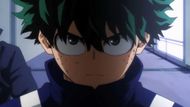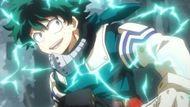My Hero Academia is one of the most spoken-about shonen series of the last decade, and the final season and epilogue made people curious about how to answer the questions that Kohei Horikoshi left unanswered. One of such loose ends, the identity and location of the biological father of Izuku Midoriya, has reoccurred in fan talk and criticism.
The creator teased the question of Deku having a father, and it was never fully answered on-page, which became a longstanding subject of focus among the readers who also want a full accounting of the matter by the series finale. This thread is unsolved, still being a point of reference to discussions on narrative closure in the My Hero Academia canon.
The most unresolved question in My Hero Academia is who and what the father of Izuku, Hisashi Midoriya, was, as the key story and epilogue did not provide any definitive answers to this question. During the run, Horikoshi admitted that the identity of Deku’s father would be unveiled at some stage, but the concluding chapters and the closing information in the anime did not conclusively reveal his identity and clarify his situation.
Various post-finales reviews and retrospectives combine to state that this particular thread remains an open question in the franchise record as of the series conclusion.
In the course of My Hero Academia, Hisashi Midoriya has appeared in a few minor instances: Inko Midoriya describes her husband and his quirk (the ability to breathe fire), but the actual appearance of the canon panels and anime episodes has never shown his appearance in the story. Critics and fans have noted the absence many times, and indicate editorial interviews and previous statements of Hornikowski as evidence that he intended to reveal himself.
The said intention would not be succeeded by the definitive on-page reveal in the serialized ending, and that is why the status of the father is one of the key secrets of My Hero Academia lore.

This mystery is important as My Hero Academia has recurrently prefigured lineage and inherited responsibility as the thematic foundation blocks. The main conceit of the series One For All and the generational relay of quirk and will makes the biological parentages pertinent to the motivation of the characters and the world-building.
The absent figure of Hisashi in the story can therefore be interpreted as an omission which has practical consequences: not just a family blank but a narrative blank that casts its interpretation of the origins of Deku and the social circumstances in which he was raised. That fact has been emphasized by critics and long-form commentators in a number of reviews of the ending of the manga.
The Unresolved Thread in My Hero Academia
Evaluating the final season of My Hero Academia and its epilogue, one should distinguish between hard facts and fan speculations. The published chapters of the manga and the official anime adaptations, until the most recent epilogue, have not portrayed Hisashi Midoriya in a manner that describes his inability or elucidates his narrative destiny.
Interviews and peripheral materials, although sometimes referring to Horikoshi's previous plans, never replace the canonical description. Hence, a reader can only make a strict statement that the identity of the father and the situation were not exhausted within the main text of My Hero Academia.
Since the inquiry is left open on the page, the commentator has listed the plausible narrative explanations of the omission without supporting any of them. There have been some professional reviews that imply the authorial choice: Horikoshi might have made the father of Deku absent as a theme in the story to maintain the emotional focus on Inko and All Might.
Other disapproving essays note that the silence was open to speculation, both practical (travelling to work in some other country, offstage heroism, etc.) and fantastical (connections with the main villains), but insist that these ideas are speculative and unproven in the text. The assessments mentioned above emphasize that it is not speculation, but the My Hero Academia record itself that should be used when making the final evaluations.

In practical terms, as a reader or viewer, the unresolved situation of Hisashi Midoriya implies that My Hero Academia still gives room to further research of interviews, databooks, or subsequent media tie-ins, to provide the context.
Until this official material is available, the decisive canon of a franchise is the primary canon, and it is currently not clear-cut. Theorists of the serial narrative observe that this strategic omission may be a purpose by the author, but it also imposes a great interpretive burden on the audience and subsequent franchise texts to make up the missing content.
To sum up, the most outstanding mystery at the end of the main run of My Hero Academia focuses on the father of Izuku Midoriya, Hisashi, which is neither addressed on-page nor is it admitted by the discourse on the series.
This omission is important because of the thematic architecture of the series, and despite suggestions as to the motivations and narrative implications by critics and fans, the canonical record has been the final word: as of the official conclusion of the series, the issue of the father of Deku has not been officially resolved in My Hero Academia.
This is why any approved follow-ups, databooks, or statements by creators that the readers may be looking to should be watched as possibly formally sealing this part of the story.
